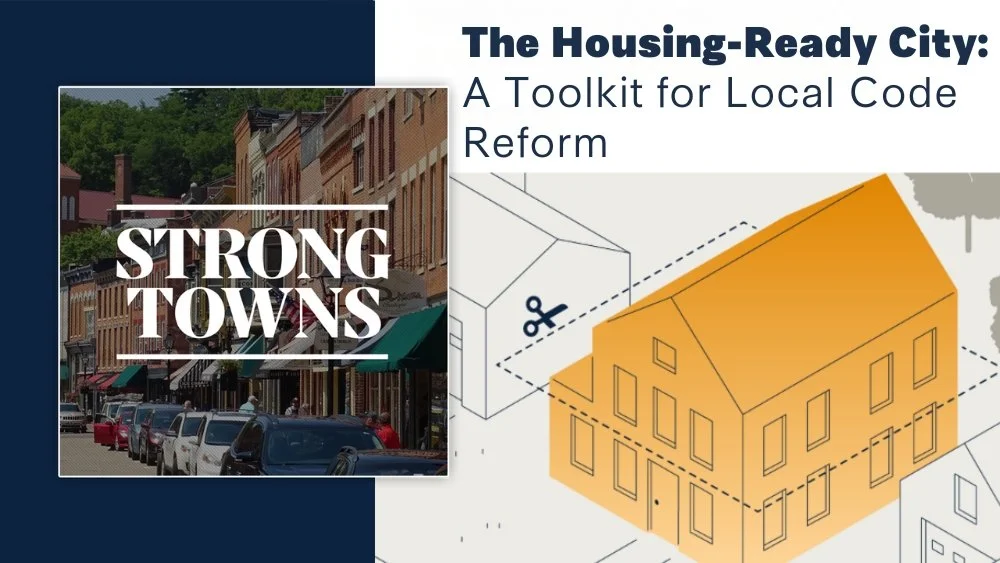A couple in Arkansas are showing how small-scale projects can breathe life into downtown and make homeownership more attainable for the next generation.
Read MoreFor years, housing production has systematically privileged corporate developers while shutting out everyone else. But cities are starting to change that. In Tennessee, this change is taking the form of a new process for preapproved plans.
Read MoreWith office vacancies and housing needs at record highs, converting one into the other seems like an obvious fix. However, office conversions are very difficult and expensive. Cities would get better results by enabling incremental development.
Read MoreChuck is joined by Seth Zeren, a neighborhood real estate developer, to discuss the six code reforms recommended in “The Housing-Ready City: A Toolkit for Local Code Reform.” (Transcript included.)
Read MoreReducing minimum lot sizes can unlock the potential for smaller, more affordable homes while meeting the needs of the community. Here’s how one developer got community support and multiplied housing availability.
Read MoreAllowing housing units to be built on small or irregular lots is a gamechanger for cities that are fighting the housing crisis. Here’s why that allowance is so important and how three developers are using small units and creativity to bring more housing options to their communities.
Read MoreTiffany Elder is a licensed general contractor, realtor and real estate investor/developer in Durham, North Carolina. She joins this episode of The Bottom-Up Revolution to discuss her career path, how her various roles intersect, and the challenges and opportunities she’s faced.
Read MoreIn this episode of Upzoned, host Abby Newsham is joined by small-scale developers Alli Quinlan and Bernice Radle to discuss their experiences as advice as incremental developers.
Read MoreDetroiters seem to be leading a reclamation of vacant homes since the Covid-19 pandemic. Here are some possible reasons for this resurgence in local homeownership.
Read MoreIn this special collaborative episode, Upzoned host Abby Newsham and The Messy City Podcast host Kevin Klinkenberg discuss small-scale development with Jim Heid, a developer and author from California.
Read MoreDo you want to create a strong incremental development ecosystem in your community? Here's a proven blueprint for success from incremental developers Monte Anderson and Mike Keen.
Read MoreSeth Zeren, a neighborhood developer and founding member of Strong Towns, returns to The Bottom-Up Revolution to talk about the political side of incremental development and how to deal with issues like balancing needed development with increased property taxes.
Read MoreIn this episode of Upzoned, host Abby Newsham is joined by Jason Carter-Solomon, an incremental developer and commercial lender in Kansas City, to talk about financing small-scale development.
Read MoreDetached cottages and additional residential units are becoming legal in many places, but zoning laws and design decisions can stop people from building. Resimate seeks to solve that, performing instant analyses of lots and helping customers purchase a variety of eligible designs from small-scale developers.
Read MoreSeth Zeren, a neighborhood developer and founding member of Strong Towns, joins this week’s episode of The Bottom-Up Revolution to talk about his experiences as an incremental developer with a midsize real estate firm.
Read MoreMany people believe that, with some zoning changes, large-scale development will be the true key to the housing crisis. This isn’t the case. Large-scale development worsens the issues that caused the crisis in the first place. Here’s a few of the ways incremental development is better for cities than large-scale.
Read MoreIncremental development is the most resilient and financially responsible way for communities to grow and improve. Town builder Monte Anderson joins us today on Upzoned to talk about his experience as an incremental developer and the important principles of the field.
Read MoreWhen people first started building malls, they had no way of knowing that dramatic shifts in technology and consumer patterns would destroy their business models. What they should've known, though, was that betting all their funding and economic stability on a single project was a bad idea. Let’s not repeat their mistakes.
Read MoreIncremental development is a low-risk, high-reward method of building a strong town. Here’s some do’s and don’ts to get you started.
Read MoreMany housing advocates celebrate large supplies of housing and low rents. However, this is only one stage of a larger boom-and-bust cycle and cannot be maintained. To break out of this cycle and sustainably improve housing accessibility, we need to redirect our focus to incremental development.
Read More



















